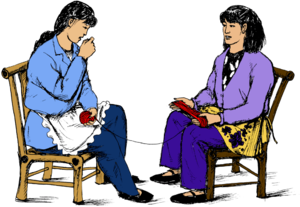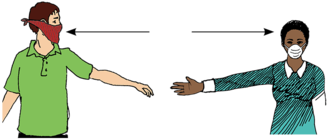Coronavirus — COVID-19
What is COVID-19?
COVID-19 is a disease caused by a coronavirus, which is a small germ (too small to see without a microscope), that can spread between people. COVID-19 causes flu-like symptoms such as a dry cough, shortness of breath, fever, weakness and body aches. COVID-19 mostly affects the respiratory system. While most infections are not dangerous, it can cause pneumonia (a serious infection of the lungs) and can be deadly in severe cases.

Coronavirus enters your body through the mouth, nose, and eyes when an infected person breathes, coughs, or sneezes on you or on surfaces you touch, and you then touch your eyes, nose or mouth. Most people get sick about 5 days after getting infected, but coronavirus can live in the body for 2 to 14 days before signs of illness appear. And some people, especially children, can be infected and never get sick. So people can have coronavirus and not know it, and transmit the virus to others. Coronavirus can live on some surfaces and objects for at least 3 days, and possibly longer. It spreads easily through contact.
Anyone can get coronavirus. If you get it and recover, it isn’t yet known whether you can get infected again. Adults more than 45 years old, especially the elderly, and people who already have illnesses, especially respiratory illnesses and weakened immune systems, are at greater risk to get coronavirus and experience more severe effects.
How can you prevent infection?
Currently there is no vaccine or specific medicine for coronavirus. Coronavirus is not killed by antibiotics or home remedies. Coronavirus can only be prevented by avoiding contact with it and cleaning frequently to kill it.
- Wash your hands frequently with soap and water or use an alcohol-based hand-rub.
- Wash vigorously with soap and water for 20 seconds, making sure to scrub beneath fingernails and cover the entire hand, wrist, and lower arm.
- Always wash hands when returning home, after using the bathroom, before meals, and after you cough, sneeze, or blow your nose.
- Avoid touching your face without first washing your hands.
- Clean surfaces (such as countertops, doorknobs, etc.) that may have coronavirus on them, using alcohol or bleach disinfectants:
- Alcohol: Isopropyl alcohol in a 70% concentration will kill the coronavirus germ quickly. Use it to clean surfaces such as countertops, doorknobs, and equipment. A 60% to 70% solution works best; do not use 100% because it will not work. If your alcohol is 100%, then add water in a ratio of 1 cup water to 2 cups of alcohol. First clean with soap and water, then clean with the alcohol solution and let it air dry.
- Bleach: : Bleach usually comes in a 5% solution. Add cold water (hot water will not work) to dilute it. For floors and large surfaces, use 2 cups bleach in a 5 gallon bucket of water (500 ml bleach in 20 liters water). To make smaller amounts, use 3 tablespoons bleach in 4 cups water (50 ml bleach in 1 liter water). First clean with soap and water, then clean with the bleach solution and let it air dry.
- Clean objects that you handle frequently with disinfectants.
- Wash clothing with laundry soap and hot water, if possible. If your washing machine has a pre-rinse cycle, be sure to use it. If washing clothes by hand, wash thoroughly, use plenty of soap, and dry in sunlight.
- To protect yourself with a mask: If you are caring for a sick person with a suspected coronavirus infection, an N95 mask will protect you much better than a surgical mask, which gives very limited protection. To use a mask properly:
- Clean your hands with an alcohol-based hand rub or soap and water, then cover your mouth and nose with the mask, making sure there are no gaps between your face and the mask.
- Do not touch the mask while wearing it, and replace it with a new one if it becomes damp.
- To remove the mask, use the elastic straps behind your head to take it off (don’t touch the mask itself), discard it immediately in a closed bin, and clean your hands.
- Do not reuse masks. If you must reuse an N95 mask, bake it at 160°F (72°C) for 30 minutes to disinfect it. Or, if you have at least 5, put each in a separate bag and rotate their use so you only use each mask once every 5 days.
- When working with sick people, it is best not to use a simple cloth instead of a mask. The cloth will get damp from your breath, making it easier for the contagious droplets from outside to pass to you.
- Wear a mask to protect others: Because a person can be infected without knowing it, wearing a simple cloth mask in public can stop people from infecting others when everyone uses one. Without a vaccine, stopping coronavirus from spreading is the only way to protect your community. You still need to wash your hands frequently and keep 2 meters (6 feet) away from people, because your mask protects your neighbors, not you.
- Monitor your health. If you have a dry cough, difficulty breathing, chest pain or pressure, and a fever, first call your doctor or the local health official for instruction about how and where to get treatment. Because the most serious danger from COVID-19 is inability to breathe (Acute Respiratory Distress Syndrome — ARDS), treatment for severe cases will include oxygen and a mechanical ventilator, available only in health care facilities.
- Source:- Hesperian.org

